|
Highlights from Wednesday, 13 April, and Thursday, 14 April |
| |
|
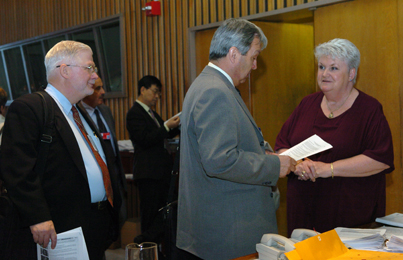 |
|
| |
|
| Delegates pick up the Chair's text on Thursday morning |
| |
|
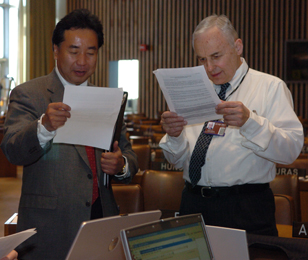 |
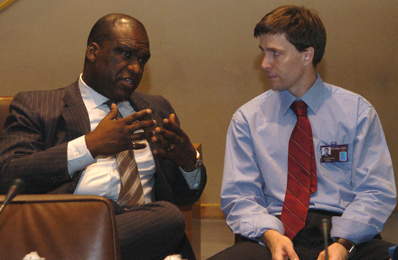 |
| |
|
| Masa Nagai, UNEP, and Andrey Vavilov, ENB, look at the text (left) and CSD Chair John Ashe with ENB writer Chris Spence |
|
| Side Event: Peer review/shared process on National Development Strategies and the French Pilot Experience |
| |
|
|
| |
|
| Nadine Gouzee, Belgium, Bronwen Jones, UK, Rudolph Kuuzegh, Ghana, and Christian Brodhag, France, who reported on the results of the French Pilot Initiative |
| |
|
|
| |
| Nadine Gouzee, Belgium, Bronwen Jones, UK, Rudolph Kuuzegh, Ghana, Christian Brodhag, France, Mary Pat Silveira, UNDESA, Ananda Rajoo, Mauritius, Barry Dalal-Clayton, International Institute for Environment and Development, and Aurore Maillet, France |
|
On Wednesday morning, delegates met for an interactive discussion on strengthening the monitoring and evaluation of water and sanitation services, and on follow-up on water and sanitation. In the afternoon, an interactive discussion took place on the linkages between water, sanitation and human settlements, and on the linkages between these themes and CSD's cross-cutting issues.
Interactive Discussions on: strengthening the monitoring and evaluation of water and sanitation services; and water and sanitation follow-up |
| |
|
| |
|
Jamie Bertram, WHO, with JoAnne DiSano, Director, Division for Sustainable Development, Vice-Chair
Khaled Elbakly , and Vivien Pliner-Joseph, Secretary of the CSD
|
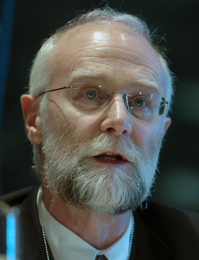 |
|
|
Richard Robarts, UNEP (above left), reminded participants that the MDG on water addresses water scarcity and quality, noting that, in many regions, water is abundant but polluted. He recalled the Millennium Assessment Report's findings that water quality is declining worldwide. Robarts stressed the need to approve the coordination role of UN-Water in monitoring, and the importance of making compiled information freely accessible.
Al Duda, GEF (above center), underscored how Integrated Water Resource Management (IWRM) is critical to sustainable development, highlighting the need to incorporate agriculture and climate shifts into IWRM. Duda emphasized that sewage pollution is the biggest water pollution problem. He also said assistance should be consistent and predictable, noting that partnerships can help achieve policy coherence.
Noting that he was speaking in a personal capacity, Patrick Murphy, EU Water Initiative (above right), underscored that a focal point among UN agencies is a necessity, and stressed the need for clarity in the roles of the UN agencies. Murphy highlighted the need for mechanisms to address the sensitive issue of transboundary water resources, and also emphasized the need to include climate change in water management.
|
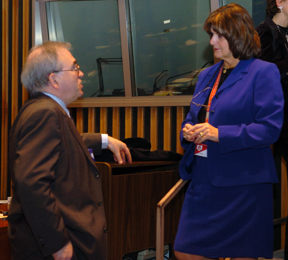 |
|
Richard Ballhorn, Canada (left), said the momentum generated in this CSD implementation cycle could be maintained by deciding to give UN-Water clear authority, roles and responsibilities. He suggested that UN-Water could hold periodic meetings with governments and civil society, and proposed implementation meetings, which could take place alongside regional banks water weeks.
Shehu Yahaya, African Development Bank, supported scaling-up investments, increasing ODA, strengthening coordination, and establishing a common framework among countries to make interventions more effective. He added that steps should be taken to ensure synergies between various agencies and organizations active on water and sanitation.
|
|
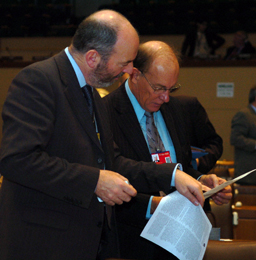 |
|
|
|
Conall O'Connell and Ross Dalton, Australia, perusing the daily ENB (left), during the discussion on interlinkages
Paul Yaw Essel, Ghana, on behalf of the African Group, discussed the AMCOW and NEPAD initiatives, called for greater financial and technical support for capacity building, IWRM, and technology transfer, urged debt relief, and stressed the importance of tapping into local knowledge.
France said effective global monitoring and evaluation required sound national and local level operations.
|
|
|
| |
Jamie Bertram, WHO (left), underscored that the drinking water goal set out under the Millennium Development Goals (MDGs) is generally on track, noting that in 2003, half of the world's population had access to safe drinking water at home. However, he expressed concern that the goal on sanitation is not on track. Bertram stressed the importance of the Joint Monitoring Programme run by WHO and the UN Children's Fund (UNICEF). Byron Blake, Jamaica, speaking for the G-77/China, stated that follow-up monitoring must be maintained by the CSD, that capacity building at the local and national levels is urgently needed, and that monitoring technologies such as remote sensing are required.
Cordell Weston, Antigua and Barbuda (right) |
| |
|
| |
| ENB writer Andray Vavilov with CSD Vice-Chair
Boo Nam Shin (left) and NGO representative R. Murali, Modern Architects for Rural India (right), who in his statement during the discussions on monitoring, called for accessible monitoring information, and noted the lack of an international institutional home for sanitation. |
| |
|
|
|
Delegates from Jamaica, Germany and Brazil (left) and panelists Al Duba and Jamie Bertram (right).
|
| | |

